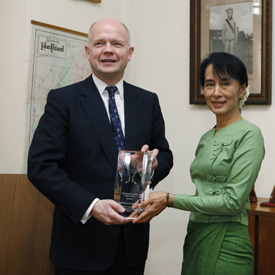Hague and Aung San Suu Kyi call for Burma changes
Foreign Secretary William Hague says a “long darkness” in Burma may be ending – but calls jointly with democracy campaigner Suu Kyi for more changes before sanctions can be lifted.

William Hague and the Burmese pro-democracy leader Aung San Suu Kyi set out similar conditions for the lifting of sanctions imposed on the country under the previous military regime at a meeting on Friday. Western countries are cautiously building ties with the new civilian government that has been in place since last March.
Mr Hague has used his visit to set out conditions for easing of tough international sanctions. Those are: the release of hundreds of political detainees, an end to human rights abuses by the army, an effort to resolve ethnic conflicts, and the holding of free and fair elections.
Four demands before sanctions lifted
Asked at a news conference what she wanted to see before sanctions could be lifted, Suu Kyi referred to what Hague, standing beside her, had said the day before. “All political prisoners should be released and there should be all efforts made to put an end to ethnic conflict within our country. Certainly we would want to see free and fair by-elections.”
Hague added: “I hope we’re at a stage where we can say a long-held dream now has a chance of being realised, but there’s so much work to be done. The long darkness in which the people of this country have lived may be coming to an end.”
The two-day visit is the first time a British foreign minister has visited Burma – or Myanmar – since 1955, before the military seized power in 1962. It is considered politically acceptable for Britain to visit now, because of signs of reform from the regime, which handed power to a civilian government last year.
The government is still backed by the army but ther have been some political and economic reforms, including the release of 230 political prisoners last October. But hundreds still remain in prison and Britain, the United States and the EU have made their release a condition for lifting sanctions.
On Thursday the EU said it plans to open a representative office in the main city Yangon.